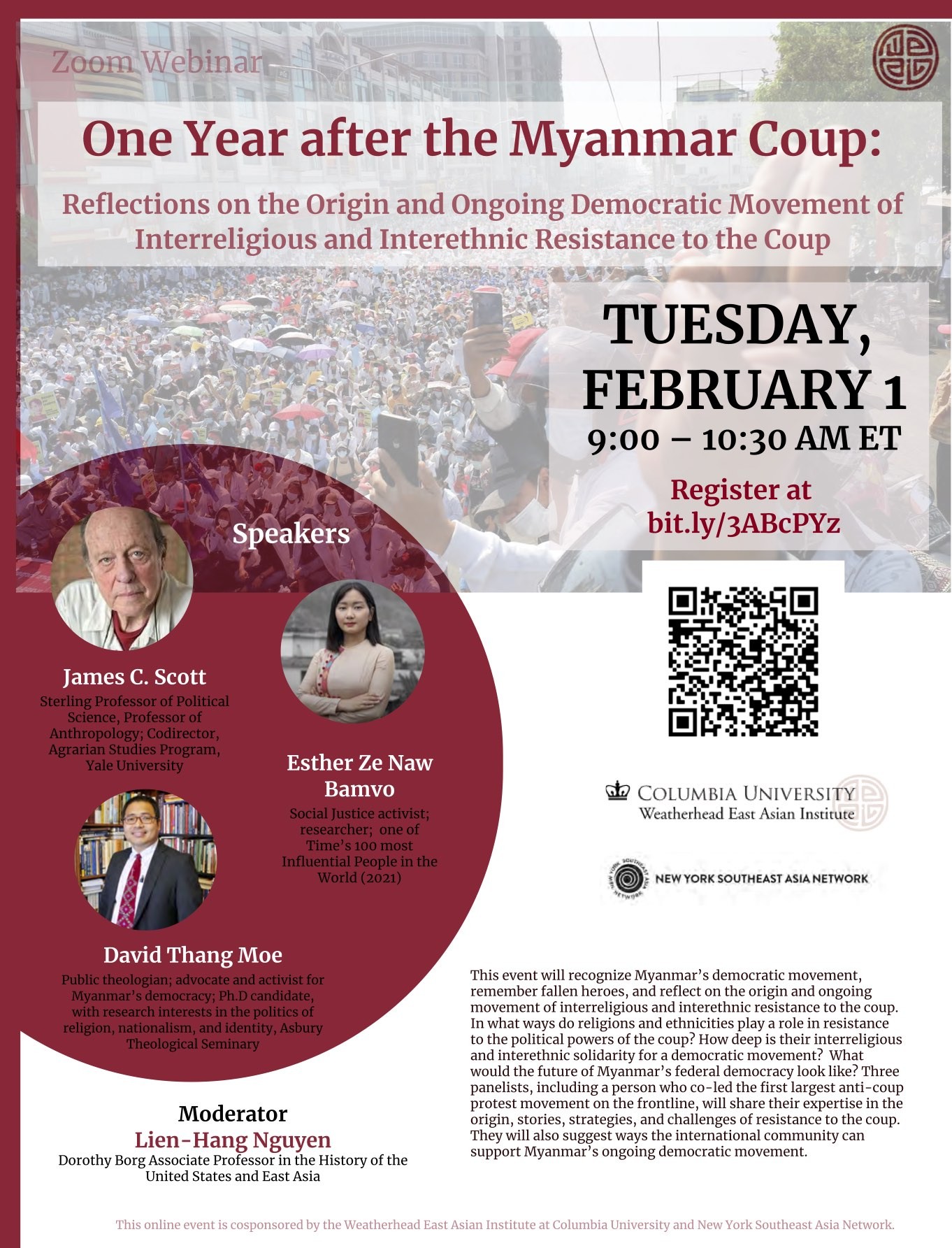Watch the recorded event here.
Speakers: Esther Ze Naw Bamvo, Social Justice activist and a researcher from Kachin – Northern Burma, who named one of Time’s 100 most Influential People in the World in 2021.
James C. Scott, Sterling Professor of Political Science and Professor of Anthropology and is co-Director of the Agrarian Studies Program at Yale University.
David Thang Moe, Public theologian, advocate, and activist for Myanmar’s democracy, Ph.D candidate, with research interests in the politics of religion, nationalism, and identity, Asbury Theological Seminary.
Moderator: Lien-Hang T. Nguyen, Dorothy Borg Associate Professor of the History of American-East Asian Relations, Columbia University
Myanmar has been a military country since 1962, but the recent military coup deserves international attention. Since the junta seized power by removing the democratically elected government on February 1, 2021, citizens from all walks of life have risen up in strong resistance to the coup. Religion and ethnicity have played a dividing and exclusionary role in Burmese politics, resulting most tragically in the persecution of the Rohingya. However, the urgent need for solidarity of an anti-coup movement led by youth from “Generation Z” has brought together protesters from different religions and ethnicities. Urban civilians, mostly from ethnic majorities, and ethnic minorities from small towns and the most remote hill villages have bridged their religious and ethnic divides to resist the coup for the common goal of federal democracy. Within one year, military junta has killed almost 1,500, detained almost 12,000, and has displaced millions of civilians. Despite the risks, civilians continue to resist the new order through various everyday and creative forms of movement.
This event, marking the anniversary of the coup, will recognize Myanmar’s democratic movement, remember fallen heroes, and reflect on the origins and ongoing movements of interreligious and interethnic resistance to the coup. Three panelists, including a person who co-led the first largest anti-coup protest movement on the frontline, will share their expertise on the origins, stories, strategies, and challenges of resistance to the coup. They will also suggest ways that the international community can support Myanmar’s ongoing democratic movement.
Speaker Bios:
Esther Ze Naw Bamvo is a Social Justice activist and a researcher from Kachin – Northern Burma, who named one of Time’s 100 most Influential People in the World in 2021. The resumed civil wars in Kachin Region in 2011 encouraged her to become an Activist and she led several civil movements and advocacy to all key stakeholders concerning with Peace, Humanitarian, Ethnic and Minority Rights issues.
In 2021 Myanmar Spring Revolution, she is one of the organizers of the first Mass Movement started on 6 th February in Yangon. Since then, she works as a steering committee member of Anti- Junta Mass Movement, and currently working as Units Leader of Kachin Political Interim Coordination Team (KPICT). She is also an Executive Committee member of Kachin Political Consultative Team, Kachin Youth Policy Working Committee and a Technical Team Member of National Ethnic Youth Alliance (NEYA).
She was a co-founder and director of Candle Library Foundation from 2012 to 2019 which provides non-formal education programs in Kachin Internally Displaced Peoples camps. She was also a Technical Team Member of Nationwide Ceasefire Coordination Team during Myanmar Nationwide Ceasefire Agreement preparation process from 2014 to 2016.
James C. Scott is Sterling Professor of Political Science and Professor of Anthropology and is co-Director of the Agrarian Studies Program at Yale University. He lives on a farm in Durham, Connecticut and was, for 22 years, a sheep breeder and shearer.
He is a Fellow of the American Academy of Arts and Sciences and has been a fellow at the Institute for Advanced Study, Princeton, and the Wissenschaftskolleg zu Berlin. In 2020, he was awarded the Albert O. Hirschman Prize by the Social Science Research Council. His research concerns political economy, comparative agrarian societies, theories of hegemony and resistance, peasant politics,
revolution, Southeast Asia, theories of class relations and anarchism. His books include Domination and the Arts of Resistance, Yale University Press, 1985, Weapons of the Weak, Yale University Press 1980, Seeing Like a State, Yale University Press, 1998; Two Cheers for Anarchism, (Princeton Press, 2013), The Art of Not Being Governed: An Anarchist History of Upland Southeast Asia, Yale Press 2009, and Against the Grain, Yale Press 2017. He formally retired in July 2021 and now calls himself “professor demeritus”. He is working on an eco-biography of the Ayeyarwady River.
His Burmese name is ရွှေ ရိုး
David Thang Moe is a Ph.D candidate in historical-theological studies at Asbury Theological Seminary, USA (originally from Mindat, Chin State of Myanmar currently under martial law). His research focuses on the politics of Buddhist nationalism, ethnic identity conflict, public theology of religions, resistance, reconciliation, and liberation in Southeast Asia. He is the author of a book Pyithu-Dukkha Theology (2017) and has published numerous scholarly articles in encyclopedia, edited books, and academic journals. He also has contributed analysis of Burmese politics of religion, ethnicity, and nationalism for the academic and popular audience in Georgetown University’s Berkley Center for Religion, Peace, and World Affairs, University of Notre Dame’s Ansari Institute for Global Engagement with Religion, and among others. He serves on the editorial teams of four academic journals. He has been actively engaging in Myanmar’s democracy movement as a public advocacy speaker at the public protest events in Louisville, KY and at some universities, including Harvard, Yale, Oxford, Cambridge, Hamburg, Boston College, Yonsei, Australian National University, University of Sydney, University of
Kentucky, Eastern Kentucky University, and among others.
This event is sponsored by the Weatherhead East Asian Institute and cosponsored by the New York Southeast Asia Network (NYSEAN).

